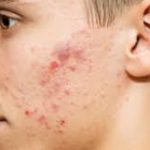
Pimples or Acne as it is better known in medicine is a disturbing and troublesome problem for many. Although it is common in adolescents and young adults, it may continue to adult life in up to 50% of the people affected. Acne is more common in the female population and is a common cause of low esteem, social inhibition and in some depression and suicidal ideation.
Pimples are caused when there is increased sebum (oil) production by the sebaceous gland in the skin.
It is also associated with certain environmental factors like smoking, occlusion of skin surface with products like oil based make-up, excessive rubbing of skin, orthopedic casts, mechanical pressure from wearing turtlenecks, bra straps, shoulder pads, and even sports helmets (acne mechanica).
Similarly, scratching acne lesions makes it worse and so is staying in humid conditions that produce sweating.
Yes, diet has a role to play in the control and prevention of acne. Avoiding high-fat foods, red meat consumption, or the eating of refined grains and sugary food like desserts help prevent or control acne.
Sometimes it’s not the food you eat. It may the medications you are taking that is bringing the acne on. Medications like lithium, isoniazid, phenytoin, testosterone, progestins, danazol and vitamins B (2,6,12) are culprits.
It is important to note that acne sometimes may be linked to a bigger medical problem in your body. People with polycystic ovarian syndrome (PCOS), congenital adrenal hyperplasia (CAH), androgen-secreting tumors, and acromegaly for example also have problems with acne.
Although not very clear but there are indications that acne formation may run in certain families.
Misconceptions about pimples.
It is not caused by exposure to sunlight or the eating of chocolates or dairy products.
Treating Acne
The first step is to take proper care of your skin. Avoid excessing rubbing, oil based makeups and keep it clean.
The use of topical retinoid like Retin-A (Tretinoin) is considered effective by many.
Some have also tried alternatives like topical salicylic acid with good success.
However, many consider combined topical therapy as more effective. For example, the combination of topical antimicrobials (like clindamycin) with a retinoid (like Retin-A). some topical combinations include non-antibiotics (like salicylic acid, benzoyl peroxide, dapsone, azelaic acid) and combine it with topical antibiotics (like clindamycin, erythromycin).
Moderate to severe acne
There may be a need to proceed to oral medications.
Antibiotics like Minocycline, doxycycline or erythromycin are usually prescribed from about 3 months to be reviewed after. The development of resistance strains to antibiotics is a concern so the benefit must outweigh the risk for the doctor to go this route.
A safe alternative is the use of Oral Contraceptive Pills (OCPs) / Birth Control Pills (BCP). This is effective for the control of acne in women and should be used more in view of the risk of antibiotic resistance considered earlier. OCPs/BCPs like Yaz or Tricyclen are examples that females can be placed on. Discuss this option with your doctor.
Severe Acne
This is usually treated with oral isotretinoin (Accutane). It is very useful for treating severe acne or acne that causes excessive psychological stress, leads to scarring or relapses.
Accutane cannot be used if sexually active without adequate contraception as it will cause defects in the fetus if a woman falls pregnant while using it.
Acne does not need to be a source of low self-esteem, see your doctor there are ways around it!